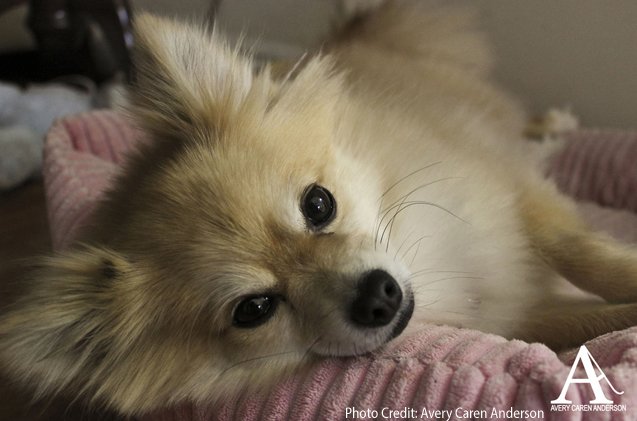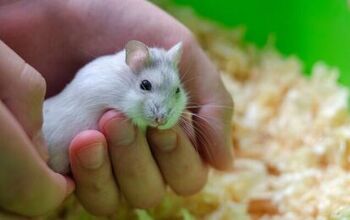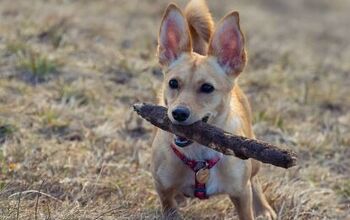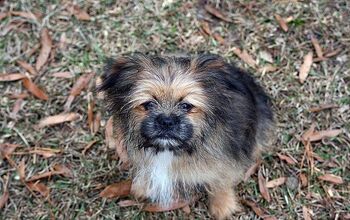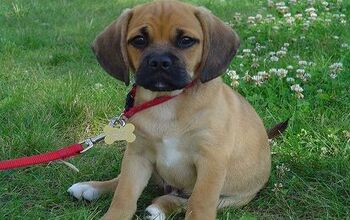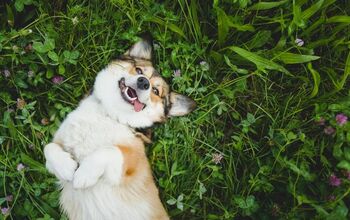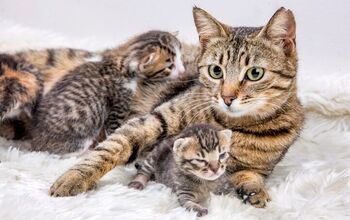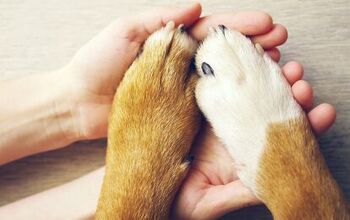Pom-Chi


About Pom-Chi
If you want a small fluffy dog with a lot of spirit, you will find it in Pom-Chi. And let’s face it…who doesn’t?! This designer dog is a sweet and affectionate little pooch that bonds strong and fast with his family. He is loyal and adorable, but also has absolutely no sense that he is so tiny. In his mind, he is as big as an Irish Wolfhound and he acts like it! For that reason, this adorable pint-sized dog will always be on guard, “protecting” his family and territory. It’s far more cute and hilarious than it is threatening, but this doggo will never know that. Pom-Chis will readily alert their owners when strangers are about, though- they might not be guard dog materials, but they do make good little watchdogs. So that’s something.
The Pom-Chi is a mixed breed dog- a Chihuahua and Pomeranian cross. This means that there will be a lot of differences with individual dogs of the breed, as there are no set standards for the appearance or behavior of most crossbreeds. Usually, these hybrids inherit a little bit from both parents. Like their mom and dad, they are also lively, affectionate, and quite smart. Of course, there are some tendencies for behavioral issues, as is common for almost any small breed dogs. Without proper socialization, they can be shy, fearful, or aggressive toward guests. So it is important for Pom-Chi’s to develop social skills early in life. Proper training and socialization during their early and impressionable years is absolutely vital.
Owing to their unique lineage, these hybrids are a versatile breed that does well in many different families and settings. Seniors and singles will find they are fantastic companions, while families with older children will appreciate their loyalty and cuddliness. There are few homes that these little pups won’t fit into Pom-Chis don’t need a ton of exercise and they are perfect for apartment or condo living. They also do well in the suburbs as well as in the country. Pom-Chis are crowd-pleasing dogs that everyone seems to enjoy. However, if you need more convincing, read on and we will break down everything that makes this pups so popular.
The Pom-Chi is a sweet and affectionate little dog that bonds strong and fast with his family.
In the 1980s, an Australian breeder crossed a Lab to a Poodle in an effort to produce a hypoallergenic seeing eye dog for his client. When he realized that the rest of the resulting litter would be considered mutts, he called them Labradoodles hoping it would attract attention and find homes for his crossbreed puppies. Well, not only that he managed to do it, but he set off a worldwide trend of crossing purebreds to create new hybrids- or designer dogs, as people started calling them. From then on, many other crosses were developed, some more popular and some less. However, the fact remains that a lot of purebred mixes are still a matter of accidental mating rather than an any sort of intentional breeding effort. This makes it hard to pinpoint when a certain designer dog breed was first created. After all, there’s certainly a chance that Labs and Poodles had mated long before anyone came up with the name Labradoodle. THere’s just no way to possibly confirm that.
The Pomeranian and Chihuahua mix dog known as the Pom-Chi has been around for decades. But it was only in the last 20 or 30 years that breeders started intentionally crossing the two breeds. The Pom-Chi Club of America was established in the late ‘90s, so it’s safe to assume that the breed was first developed in the United States at some point around that period. Although Pom-Chi is the official name of the breed, these dogs can be found with names like Chi-Pom, Chimeranian, or the mouthful Pomahuahua.
Photo credit: Jennifer Stacey
Resulting from a crossbreeding between a Pomeranian and a Chihuahua, the Pom-Chi is a hybrid dog. A great deal of these dogs are a so-called first generation mix (aka a 50-50 mix of the two purebreds). Their appearance and behavior can be hard to predict. F1 Pom-Chi puppies can favor one of the parents or be an almost equal mix of both parents. The first generation is a true cross while successive breeding of the original puppies will eventually result in a more standardized look and temperament. These things take time. Check in after a few decades and there might be predictable Pom-Chis available. For now, it’s a roll of the dice with every pup. Fortunately, they are adorable regardless of which parent that they favour. All Pom-Chis have that going for them.
Pom-Chi enthusiasts have plans to continue to develop this hybrid until it has successfully continued for 7 generations. Once that has been done, the Pom-Chi will have the opportunity to be considered a purebred dog. This will also result in the ability to be registered with the more prestigious canine registries. So stay tuned if you care about such classifications. It’s coming!
For such little dogs, Pom-Chis have surprisingly big appetites. One would think that they were some kind of retriever by the quantities that these little guys can consume. Naturally, any responsible owner should make an effort not to indulge their voracious appetites. These compact canines need small amounts of nutritionally dense foods to thrive, and overfeeding them can quickly result in obesity. Even a small weight gain can wreak havoc on your pet’s health, as their small frame doesn’t do well with excess pounds. Joint pain, diabetes, and heart issues are all common consequences of canine obesity. So this is not an issue to be treated lightly. You must be diligent about what you feed any pet to ensure that your food babies live long and healthy lives.
So, how do you pull that off? Owners should be sure to feed only high quality, dry kibble to their Pom-Chis. Food that is specifically designed for small and active dogs is best. Wet and canned foods should be avoided because of the Pom-Chi’s predisposition to oral health troubles such as tooth decay, tooth loss, gum disease and bad breath. If you are ever concerned about your pup’s diet, then it’s always wise to consult with your vet. While dog food manufacturers offer important guidelines, no one understands your specific pup’s needs quite like their veterinarian. Always defer to them in times of doubt. It’s why you have a vet, after all!
Intelligent and eager to please, the Pom-Chi is trainable but he is stubborn as well.
Intelligent and eager to please, the Pom-Chi is trainable, but he is also stubborn and will show it. Only positive training techniques should be employed with this crossbreed. They do not respond to physical or other harsh training methods (Nor does any animal. Such techniques should be considered abuse, not training). Calm and consistent training sessions will prove to be the most successful option. Yummy treats and over-the-top praise will help keep your Pom-Chi interested and in tune during training. Patience is required. It will pay off if you stick to training plan and start it early. Don’t give up!
Pom-Chis should tip the scales between 2 and 10 pounds and stand from 6 to 9 inches tall at the withers.
Affectionate and good-natured with their families, Pom-Chis love and adore their humans. They attach quickly to them and bond for life. As tiny as they are, Pom-Chis think they are huge and will fiercely protect their families. They make awesome watchdogs. However, this instinct comes with a major downside. Pom-Chis can be quite yappy, especially if they are left alone. Pom-Chis can also suffer from separation anxiety and do best when they have at least one family member with them at all times. So, this should be considered as an important factor before bringing a Pom-Chi home. If your dog will need be left alone for significant periods of time, then a Pom-Chi might not be the wisest choice for your home.
Pom-Chis love to play and are quite active, especially given their miniscule size. They will readily race about the house chasing a ball or some other toy down the hallway. So there are plenty of ways to ensure your Pom-Chi gets their daily exercise without leaving the house. The Pom-Chi prefers to be around adults and older kids. Younger ones tend to be a little too active for them! Yet another important consideration before bringing one of these pretty pups into your home.
Because this is a relatively new crossbreed, there isn’t significant data to completely understand all of the potential health problems for the Pom-Chi. It is fair to state that issues that could be genetically passed from the parents could be found within the puppies. Some of these problems can be skin disorders, progressive retinal apathy, cataracts, Ectropion, hypothyroidism, epilepsy and oral health problems.
The average Pom-Chi lives to be between 12 and 18 years old.
Pom-Chis are energetic, but oddly don’t require much exercise. For the most part, the Pom-Chi will exercise himself right inside of the house with all of his bouncing-ball daily activities! Of course, he still needs to get fresh air and go outdoors to use the bathroom. This hybrid breed is perfectly happy with a few short walks each day. That should be plenty. However, there are dangers out there for this pocket-sized pup. He should not go to any dog park unless it has an area that is designated for toy breed dogs. Large dogs can do severe harm to the Pom-Chi by merely trying to play with him. Caution should be exercised anytime the Pom-Chi is around larger animals. So, pay special attention to your Pom-Chi anytime that he is outside. Things can get out of control quickly if you aren’t careful.
Affectionate and good-natured with their families, Pom-Chis love and adore their humans.
Because the Pom-Chi is a crossbreed, it is not recognized by major dog registries such as the American Kennel Club and the Canadian Kennel Club. The Pom-Chi is only recognized by registries that accept mixed breed, crossbreed, and designer dogs. These include the American Canine Hybrid Club, Designer Dogs Kennel Club, International Designer Canine Registry, Designer Breed Registry and the Pom-Chi Club of America.
The Pom-Chi may have a short coat or a long one- there are no guarantees. After all, this is a crossbreed and could take on the characteristics of either parent. Coats may be single or double, dense or sparse. The colors can be any solid, merle, sable or parti-color under the sun. It is so unpredictable.
Grooming will vary just as the coats do. Pom-Chis are known to have skin sensitivity and should be brushed twice each week with a soft bristled brush. Bathing should be done every season or if the dog gets dirty or smelly. However, it is important to be quite gentle and careful when bathing a Pom-Chi due to their small and delicate stature.
Pom-Chi puppies are cute and adorable but they do take a lot of work. They need to be socialized from the time they get to their new homes and this should continue throughout their lives. While Pom-Chis can grow up to be well-trained good boys, it’s important to instigate the training and socialization process early and often. Puppy Kindergarten classes are a great way to lay the foundation for basic manners as well as a form of socializing with new people and pets. It’s not necessary to take on this training burden on your own. Not when there are so many wonderful and dependable services available.
These little guys can either be housebroken or trained to use a litter box. Whichever method is best for you, you will still need to carefully watch for the Pom-Chi’s signals that they need to relieve themselves. With a watchful eye, this crossbreed can be potty trained quickly. It merely requires patience, persistence, and love.
Additional Photo Credits: Angie/Flickr

Amy Tokic, Editor of PetGuide.com, is a passionate animal lover and proud pet parent of Oscar, a Shih Tzu/Chihuahua cross, and Zed, a Japanese Chin. Her love of animals began in kindergarten, when she brought her stuffed dog Snoopy into class with her every day. Now, she writes about her adventures in pet ownership and tirelessly researches products, news and health related issues she can share with other animal enthusiasts. In her free time, Amy loves perusing used book and record stores, obsessing over the latest pet products available and chasing squirrels with wild abandon (a habit attributed to spending too much time with her pooches).
More by Amy Tokic



